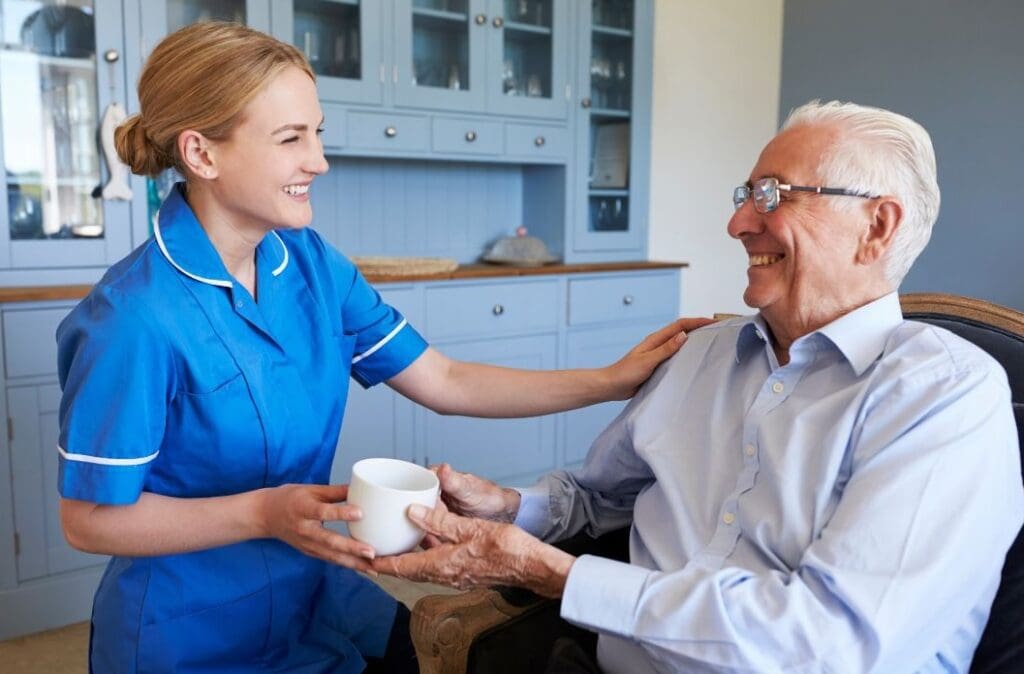Building a strong and positive carer-patient relationship is more than just a cornerstone of effective care; it’s a bridge that connects two individuals through mutual respect, understanding, and support.
The dynamics of care are ever-evolving; the essence of a patient-carer relationship remains rooted in the principles of empathy, communication, and genuine concern for the well-being of one another.
Whether you’re stepping into the shoes of a carer for the first time or looking to strengthen an existing bond, the path to a more optimistic relationship is just around the corner.
With the help of a dedicated live-in carer, transforming the quality of care into a shared positive experience becomes not only a goal but a reality.
Choose Your Carer Carefully

This begins with the careful selection of the right person for the patient-carer relationship to work effectively.
Beyond qualifications and experience, the essence of the relationship lies in matching personalities, shared interests, and a mutual understanding of needs and expectations.
It’s about finding someone who brings not just skills but also warmth and positivity to the care environment.
This selection process, often navigated with recommendations, thorough interviews, and a keen sense of intuition, is your first step towards building a foundation of trust and respect.
Set Boundaries
Establishing clear boundaries is vital to guiding caregiving, ensuring everyone knows the paths to tread and the ones to avoid.
It’s about setting expectations for personal space, privacy, daily routines, and even the finer details of care-based tasks.
This involves open dialogue, where both carer and patient express their needs and concerns, adapting the boundaries to fit comfortably for both.
Ensuring these boundaries are respected fosters a relationship where both parties feel acknowledged and valued, creating an atmosphere of trust and safety that is crucial for effective caregiving.
Be Respectful of Privacy

Privacy is vital in care, where dignity and respect hold the keys to trust and comfort between carer and patient.
For carers, this means adopting a practice of mindfulness and sensitivity towards the individual’s personal spaces and belongings.
But it’s not just about actions; it’s also about fostering an environment where open communication flourishes.
Reassuring the person in your care that their privacy is not just a policy but a principle you live by can make all the difference.
It tells them they’re not just a task to be managed but a person to be honoured.
This respect for privacy is a cornerstone of the trust that underpins a truly positive and nurturing carer-patient relationship, ensuring that care is not only provided but also felt.
Always Remain Patient
Patience is a virtue, especially in caregiving, however it is provided, by whomever is providing it.
The ability to stay calm and understanding, even in the face of challenges, speaks volumes about a carer’s character and commitment.
Patience fosters a stable and supportive environment, crucial for the well-being and comfort of those in care.
Remember, it’s about providing support at a pace that respects the patient’s needs and circumstances.
Learn to Ask for Help

No carer can be expected to be completely alone; understanding the right moment to reach out for extra assistance isn’t just wise, it’s a strong decision that reflects dedication.
It’s about acknowledging that sometimes, you need a bit more than just your resilience to navigate the challenges of caregiving.
Whether it’s seeking advice from healthcare experts, connecting with others in similar situations through support groups, or considering respite care to take a well-deserved break, reaching out is an important step towards maintaining a sustainable care routine.
This process is all about building a robust support network that uplifts both you, the carer, and the person you’re looking after.
It ensures that caregiving remains positive and fulfilling for everyone involved, highlighting the importance of community and shared experiences in making caregiving a mutually rewarding endeavour.
Establish Trust
When it comes to building trust in a carer-patient relationship, several key factors come into play.
Firstly, the carer needs to establish a clear line of communication with the patient, letting them know that they are there to listen and support them in any way they can. This means actively listening to the patient’s concerns, empathising with their situation, and being transparent and honest in all interactions.
Another important factor is reliability.
Patients need to know that their carer is someone they can count on to be there for them consistently and reliably, whether it’s for medical appointments, help with daily tasks, or emotional support. This means showing up on time, following through on commitments, and being there when the patient needs them.
Above all, building trust in a carer-patient relationship requires an unwavering commitment to the patient’s best interests. This means putting the patient’s needs and preferences first and working together with them to develop a care plan that is tailored to their individual needs and goals.
With trust as the foundation of the relationship, carers and patients can face the challenges of illness, disability, and ageing together with confidence and mutual respect.
Why is it Important to have a Positive Relationship with Your Carer?
A positive carer-patient relationship goes beyond the mere execution of tasks; it’s about creating a bond that enhances the overall quality of care.
This relationship fosters a sense of security, promotes well-being, and supports the independence and dignity of those in care.
It’s a bond that enriches the lives of both the carer and the patient, making every day more meaningful and fulfilling.
A caring partnership truly makes a difference, remember that the essence of a positive relationship lies in the shared commitment to kindness, understanding, and mutual support.
For those looking to begin or enhance an existing relationship, taking the step to arrange live-in care can be a transformative decision.
At IP Live-In Care, we fully understand that it’s about choosing to place the well-being of your loved one in hands that not only care but also cherish, understand, and respect.